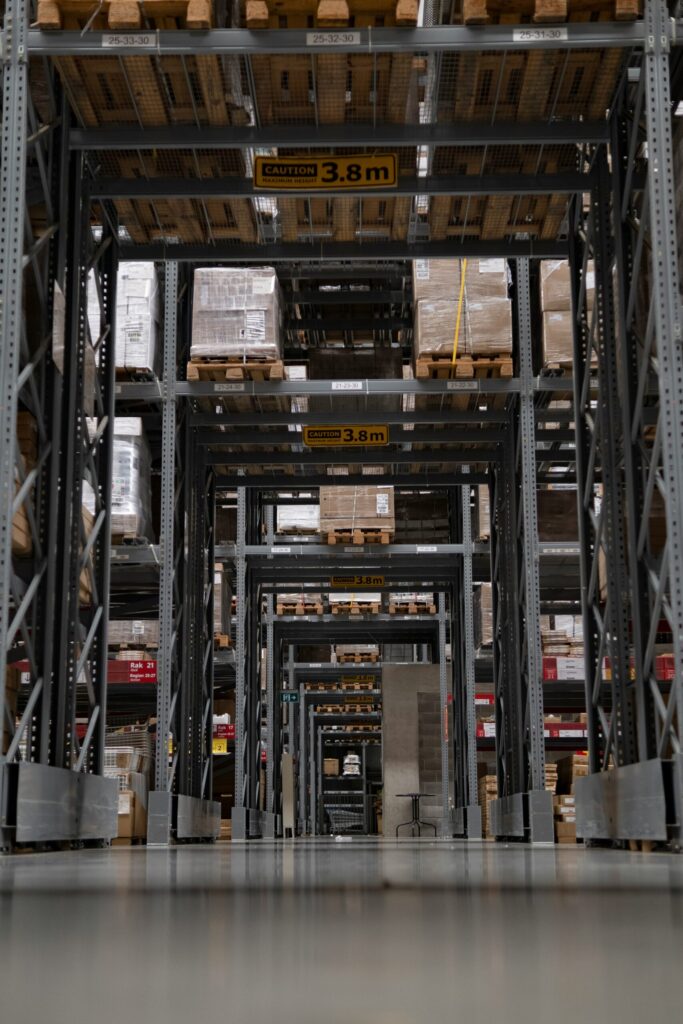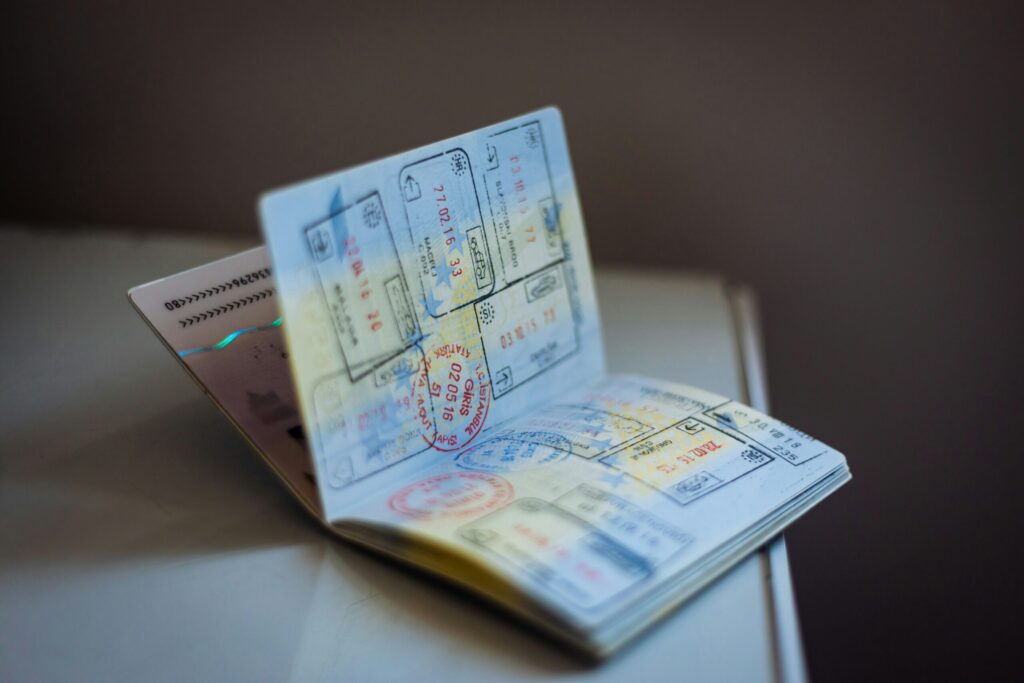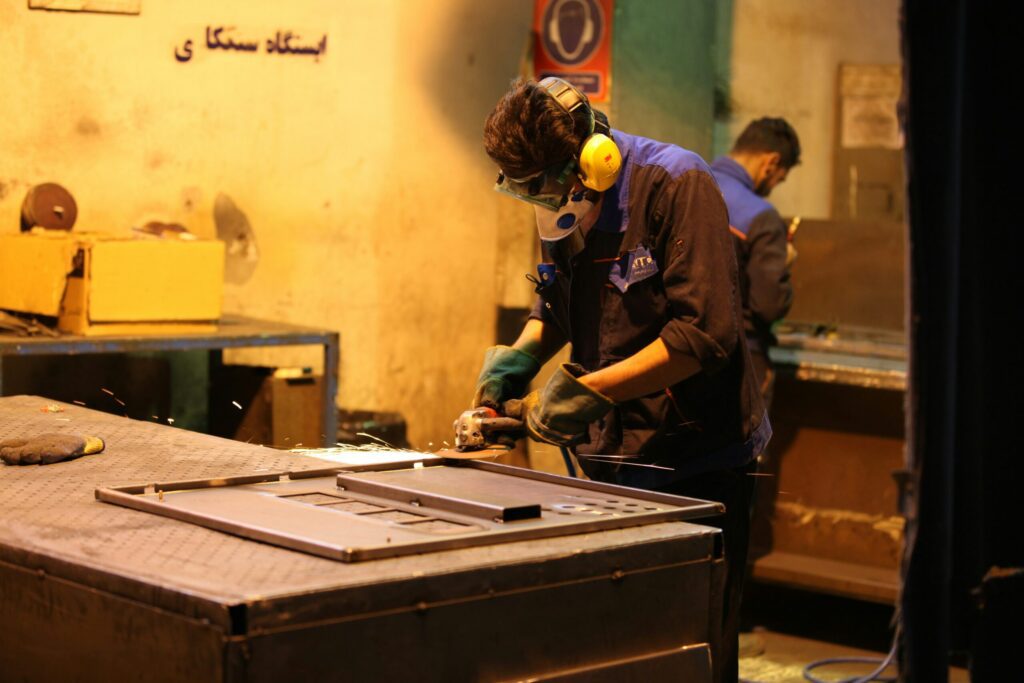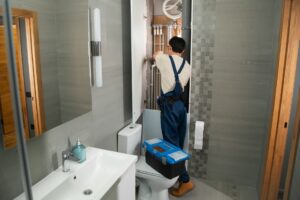 Plumbing jobs in the UK are a professional trade that maintains the proper operation of homes, businesses, and entire cities; it’s not simply about mending leaking taps. Plumbers perform anything from installing state-of-the-art heating systems to repairing the nation’s deteriorating water infrastructure.
Plumbing jobs in the UK are a professional trade that maintains the proper operation of homes, businesses, and entire cities; it’s not simply about mending leaking taps. Plumbers perform anything from installing state-of-the-art heating systems to repairing the nation’s deteriorating water infrastructure.
Doctors and teachers are frequently the first occupations that most people think of when they think of vital professions, but anyone who has ever had a burst pipe in the dead of winter will tell you that a skilled plumber is invaluable. After obtaining their qualifications, plumbers can choose to operate independently or as a team inside a plumbing services firm. Additionally, there are prospects for site-specific plumbing positions that provide long-term work in a business or institution, such as a major corporation or university. Fixing leaks and clearing clogged pipes is only one aspect of a plumbing career; another is offering vital services that enhance people’s quality of life. It has some benefits that make it a desirable career choice:
Are Plumbing Jobs in Demand in the UK?
Yes, plumbing jobs are in high demand in the UK. The demand for plumbers is the worst-kept secret in Britain. Poor training opportunities and a shortage of skilled people are the industry’s two biggest problems, according to a survey by HPM Magazine. The skills gap, according to more than half (56%) of respondents, is the largest problem currently confronting the plumbing sector. But because there is a lot of work and great job satisfaction, more than four-fifths (86%) of plumbing experts would still suggest it as a job. Plumbing is a common feature of all homes in the UK, including high-efficiency Passive Houses, insulated new construction, and historic stone cottages.
Finding a trustworthy and skilled plumber is a constant search for homeowners. The building services industry is undergoing many changes, and plumbers are in a great position to benefit from them. For renewable technologies like solar thermal and heat pumps, their credentials and abilities provide the ideal foundation. No matter the fuel or heating technology, there will always be a need for people with plumbing credentials and practical expertise.
13 Best Plumbing Jobs in the UK
-
Master Plumber
The highest professional level in plumbing is a master plumber. An apprentice becomes a journeyman, who then becomes a master plumber. Your major duties as a master plumber are to install and repair water systems in homes and businesses according to safety and energy efficiency laws and regulations. As part of your profession, you will draw and read blueprints, install water system appliances, fixtures, and pipes, such as water heaters, showers, sinks, and toilets, and service and repair such items. As a master plumber, you might also be responsible for training and managing journeyman and trainee plumbers.
-
Plumbing Engineer
Plumbing engineers create plumbing systems for homes, businesses, and public spaces. With mechanical, civil, or fire safety engineers, they usually collaborate on huge projects. Stormwater drainage, fire suppression, sewage waste, and potable water systems may all be designed by them. To assist building managers and construction workers in navigating a building’s plumbing system, plumbing experts can also provide design drawings using CAD software. The terms plumbing design engineers and plumbing engineers are interchangeable.
-
Foreman in Plumbing
Usually employed in construction or maintenance, a plumbing foreman oversees a group of plumbers or other staff members. You are a journeyman plumber and supervisor when you work as a plumbing foreman. Your responsibilities include overseeing the installation and maintenance of plumbing systems, including drainage and wastewater disposal, interior fire sprinklers, landscaping sprinklers, and water delivery systems. For employment in a range of job locations, plumbing knowledge in residential, commercial, and industrial settings is beneficial. The duties of a plumbing foreman include managing a team of workers, assigning work as needed, interacting with management and site personnel, identifying plumbing issues, and maintaining all required equipment.
-
Licensed Plumber
Problems with pipes and plumbing are identified and fixed by a qualified plumber. In addition to repairing valves, choosing the best tools for plumbing tasks, installing water pumps, and disassembling sinks, bathtubs, and toilets to inspect and reassemble pipe sections, plumbers also study and interpret plans to locate drainage systems. These duties, along with creating work estimates, negotiating plumbing contracts, and organizing large plumbing projects, are performed by licensed plumbers.
-
Designer of Plumbing
An engineer or designer who focuses on plumbing system design is known as a plumbing designer. Developing a household plumbing system, a fire suppression “sprinkler” system, drainage networks, or commercial or municipal plumbing systems could be among your duties. To see the pipes and fixtures, you can use CAD or Revit design software. After designing the project according to the client’s demands, you incorporate details regarding the materials needed, pipe sizes, and installation and drainage needs.
-
Plumber Journeyman
A journeyman plumber is a competent professional who specializes in handling any type of plumbing in both residential and commercial settings. Installing new gas lines, drainage systems, and plumbing systems in addition to maintaining and repairing old ones are among the tasks and obligations of a journeyman plumber. From toilets to washing machines, Journeyman plumbers are specialists in pipelines, fittings, and all types of plumbing equipment. Apprentice plumbers can be trained, supervised, and assisted in their journey to become journeyman plumbers. A journeyman can become a master plumber with sufficient experience.
-
Plumbing Examiner
To verify that the piping has been installed correctly and that the system conforms with local, state, and federal requirements, a plumbing inspector inspects and tests other plumbing and drainage systems. Commercial and public-use buildings usually need this service. Reporting any unsolved issues, training building owners on how to correct code breaches, and examining construction plans are all part of your duties as a plumbing inspector. The project must use the correct piping size, couplings, trap seals, and cleanouts, and the contractors must only use allowed materials, devices, fixtures, and equipment. You must verify this throughout your visual and mechanical inspection.
-
Plumber
Plumbers work on both new and old structures, installing, maintaining, and repairing water pipes, drains, and fixtures. They can recognize and fix a wide range of problems and are physically capable of carrying out physically demanding tasks. Toilets, sink and shower drains, garbage disposals, and occasionally sewage lines are among the tasks included in the job. Although regular maintenance is a component of the job of plumbers, they are frequently called upon for emergencies like bursts or leaky pipes. Good plumbers therefore typically enjoy some work security and are in high demand. They are frequently on call on weekends and holidays or awake at strange hours due to the nature of their employment.
-
Drain Cleaner
Cleaning drains and pipes, including floor drains, sinks, tubs, toilets, and urinals, is what a drain cleaner does. Sewer cameras, high-velocity water jets, and electric snakes are common tools used for drain line inspection. Positions with more technical service responsibilities, such as fixing underground drains and sewers with excavation techniques, are more sophisticated. Steam thawing and frozen line repair are additional tasks. You must abide by company regulations as well as any local or state laws to keep your workplace safe.
-
Plumber for Commercial Use
A commercial plumber works in commercial structures like offices, retail stores, and hospitals. The scale of the building and the need for commercial space make commercial plumbing different from domestic plumbing. Assembling, installing, and fixing water and sewage plumbing systems may be among your duties. You will be good at certain materials and plumbing maintenance.
-
Maintenance Plumber
One position in the plumbing industry that focuses on maintaining huge water systems is that of a maintenance plumber. In this line of work, you work with bigger companies to manage the plumbing systems of expansive buildings or campuses. The sort of structure you are managing will determine your obligations, but generally speaking, you are responsible for installing, maintaining, and repairing gas, water, irrigation, and sewer systems. The systems you work on as a maintenance plumber are typically made to be used extensively by several people. Plumbers who work on individual systems in homes are not like this.
-
Assistant Plumber
A plumber assistant helps pipefitters and plumbers with pipe maintenance and repair. The availability of the equipment required to finish the job is ensured by plumber assistants. They also set up the workspace, allowing pipefitters and plumbers to do tasks faster and with fewer mistakes. Plumber assistants also drill holes, measure and cut new pipes, help remove pipes, go over drawings, and keep up-to-date on job site safety procedures.
-
Drain and Sewer Technician
In the United States, the majority of sewer and drain technicians presently make between $45,000 (25th percentile) and $64,000 (75th percentile) per year. Although some progression is conceivable, this moderate salary range indicates that remuneration in this profession will be consistent independent of skill level, location, and years of experience.
Read Also: Leave to Remain in the UK
Plumbers’ Job Advancement in the UK
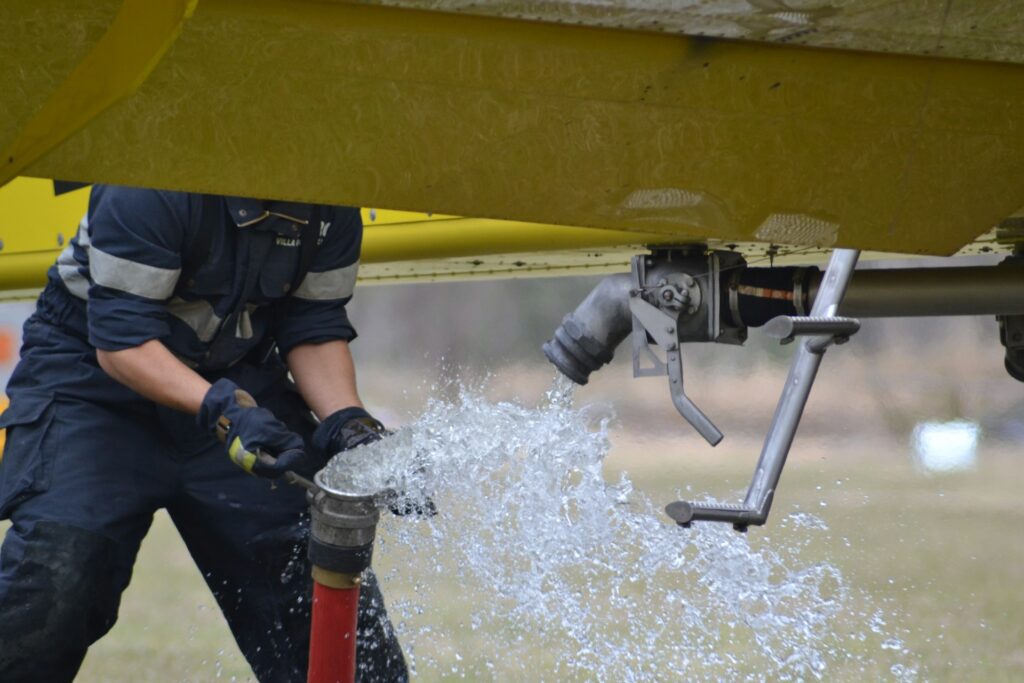 By completing your ACS Gas qualifications, which will enable you to become Gas Safe Registered and work on home gas appliances, you may advance your plumbing job. In just eighteen weeks, plumbers may upgrade their skills to become gas-safe qualified by taking the Domestic Gas Heating Installer Course offered by Skills Training Group. Installing, maintaining, and repairing oil-fired appliances is made possible by earning your certification from the Oil Firing Technical Association (OFTEC) by finishing the OFTEC Oil Course offered by Skills Training Group. To further improve your job possibilities, you might potentially advance into a management or supervisory position.
By completing your ACS Gas qualifications, which will enable you to become Gas Safe Registered and work on home gas appliances, you may advance your plumbing job. In just eighteen weeks, plumbers may upgrade their skills to become gas-safe qualified by taking the Domestic Gas Heating Installer Course offered by Skills Training Group. Installing, maintaining, and repairing oil-fired appliances is made possible by earning your certification from the Oil Firing Technical Association (OFTEC) by finishing the OFTEC Oil Course offered by Skills Training Group. To further improve your job possibilities, you might potentially advance into a management or supervisory position.
Other Ways to Start Plumbing Jobs
-
Standard Plumbing Apprenticeship
The conventional entry path is finishing a four-year plumbing apprenticeship. To accomplish this, you must work for a plumbing company that allows you to gain on-the-job experience. The four-year curriculum typically consists of two weeks of working alongside a plumber and one week of theory and practical training. You will complete the apprenticeship via block releases. You will often receive instruction on home heating systems during the third year of your apprenticeship, which will enable you to earn your Gas Safe Registration after the program.
Since the training is funded, there is no cost to you. You have plenty of time to complete your coursework and earn your degree. There will be lots of experience dealing with a tradesman on the job site. Also, while you train, you will receive a modest wage. Your income potential will take longer to realize because it will take you four years to qualify.
-
Fast Track plumbing course
Students who want to become plumbers quickly can choose from several fast-track plumbing courses. These courses will cover the essential elements that will launch your plumbing career. However, they will not go as far as traditional apprenticeships. This is typically the greatest choice for people who are unable to locate an apprenticeship. The most popular choice for fast-track plumbing courses is the City and Guilds Accredited Level 2 Diploma in Plumbing Studies, which takes 8–10 weeks to finish.
Here, you learn the fundamentals to qualify because the program has an accreditation. You can begin making money more quickly because the program only takes 8–10 weeks to finish. The training is open to anyone 16 years of age or older. You will have to prepare well for future upskilling, including becoming Gas Safe Registered. But, you will have to complete the training that requires payment.
-
Serving as a Plumber’s Assistant
You can begin as a plumber’s assistant or “mate” and complete on-the-job training if you know someone in the field. However, this path is not advisable because it will not qualify you. However, it can be an excellent way to begin your plumbing career. Earn right away. Acquiring practical on-site plumbing knowledge won’t make you eligible. Your actual earning potential won’t be realized, but you will get the basic knowledge of plumbing jobs.
What are the Working Hours of a Plumber?
A plumber puts in 37–40 hours a week on average. Self-employed people, however, frequently discover that their working hours might be far longer. You will need to work outside of regular business hours to deal with emergencies. These emergencies are issues such as busted water pipes or boiler breakdowns, which result in the highest pay. For after-hours situations, plumbers frequently charge more than £100 per hour.
Read Also: Unskilled Jobs Visa Sponsorship UK 2025
Plumbing Jobs Salary in the UK
Potential income is one of the first factors to consider when evaluating a professional choice. The typical wage for plumbing jobs in the UK varies based on region, expertise, and experience. A plumber’s pay in the UK can range from £25,000 to £40,000 or more. This salary is according to data from the National Careers Service. Experienced plumbers and those who own profitable firms tend to make more money.
Plumbers may earn more money if they operate in cities. They can earn more in other places where there is a large demand for their services. Due to the specialist skills needed, people who focus on niche fields like gas installation or renewable energy systems may also make more money. All things being equal, one advantage of being a plumber in the UK is the possibility of earning a respectable living.
Conclusion
Plumbing is one of the skilled crafts that is particularly important to maintaining the infrastructure of our homes and buildings. Plumbing jobs also present a viable career route for individuals who enjoy doing hands-on work. In addition to making sure that industrial buildings like manufacturing facilities can operate safely and effectively. Furthermore, plumbers are crucial to the correct installation and operation of our water systems.


